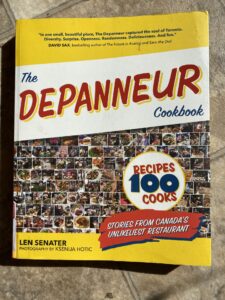 Disillusioned with his job in a Toronto design firm, Len Senater was seeking a more meaningful direction. When he found a moribund convenience store for sale near his home, he decided to buy it. Being the age of pop-up restaurants and shared working spaces, he hoped to turn his new investment into a combination café/corner store with a weekend brunch. Little did he know that it would become a decade-long project that would engage the whole community.
Disillusioned with his job in a Toronto design firm, Len Senater was seeking a more meaningful direction. When he found a moribund convenience store for sale near his home, he decided to buy it. Being the age of pop-up restaurants and shared working spaces, he hoped to turn his new investment into a combination café/corner store with a weekend brunch. Little did he know that it would become a decade-long project that would engage the whole community.
Named The Depanneur––a nod to his happy years in Montreal––the new place could provide a clean, safe, inspected venue for non-professional cooks. Len put a poster in the window inviting people to an open house where they could donate their surplus kitchenware to help set up his enterprise. The event offered a novel way to get the neighbourhood involved.
After a soft opening as a supper club in Aug 2011, The Dep hosted pop-up events built on a shared risk/shared reward model. In November, Len began experimenting with cooking classes and, by the end of the year, The Dep was serving dinner, putting on events, renting kitchen space, selling products, making brunch and getting press. Len cooked one night a week for what became Drop-In Dinners.
Although first anniversary of the venture was celebrated with a watermelon party, Len was deeper in debt than when he started. Reluctantly, he made the heart-wrenching decision to close the daytime café and store to focus solely on evening and weekend programs.
By 2013 The Dep was hosting over 300 food events a year––a combination of Supper Club, cooking classes, private parties, and personal one-night-a-week cooking, As essentially a one-man show, the work was exhausting. Len had left a decent-paying career as a designer to spend years navigating the challenges of multiple municipal by-laws and licensing standards until The Dep finally earned the right to officially exist. Fortunately, by the end of five years, he had paid off his debt and was no poorer than when he started.
In 2016, the Canadian government and settlement organizations were scrambling to accommodate thousands of Syrian refugees. Many were housed in hotels for weeks or even months at a time with no kitchens to cook for themselves.
In a small gesture of hospitality, The Dep invited a few newcomer women to use its kitchen to prepare and share dinners. The prospect of a familiar, home-cooked meal offered a welcome break from the tedium of hotel living. This small act, initiated by a few volunteers using donated ingredients, quickly blossomed into a joyful and delicious weekly gathering. To sustain the initiative, the group began to prepare extra meals to sell to offset costs. The revenue paid for the ingredients and the kitchen space; any surplus was divided among the cooks.
Within a matter of months, the aptly-named Newcomer Kitchen project had grown to include over 50 Syrian families and a large team of volunteers. Each week a group prepared fifty meals to be sold online for pickup & delivery, turning newcomer talent into delicious food, economic opportunity, meaningful work and a bridge between cultures––a new model that could work with any newcomer community, in any kitchen, in any city in the world.
Len Senater’s latest venture is The Depanneur Cookbook––a combination of memoir, manifesto and recipes––showcasing Toronto’s cultural diversity and modern immigrant stories. Launched on the fundraising platform, Kickstarter, in November 2020, this cookbook reached its original goal of $20,000 in only eighteen hours and went on to become the most online-funded Canadian cookbook project ever. 
At the Last Chapter Brunch on the final day of Kingston Writersfest 2024, Len Senater treated participants to his odyssey of turning a defunct corner store into The Depanneur, an on-going experiment built on the premise that sharing food builds community and connects people in meaningful ways. Bravo, Len Senater!
